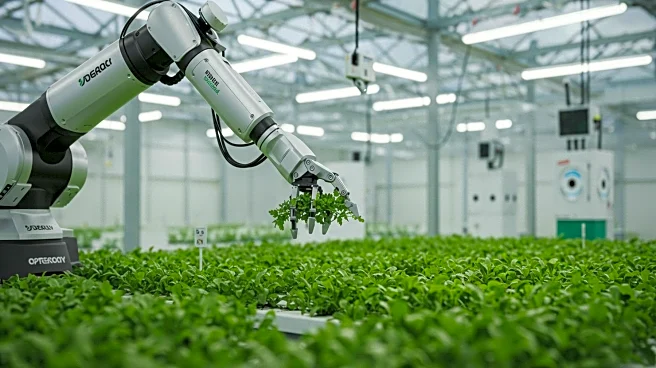What is the story about?
What's Happening?
The agricultural sector is undergoing a significant transformation with the adoption of cutting-edge technologies expected to be widespread by 2025. Innovations such as precision robotics, sustainability strategies, and precision-driven methodologies are revolutionizing food production, soil and water management, and environmental health. Precision farming, which utilizes satellite imagery, IoT sensors, and drones, allows for real-time monitoring and management of crop health, soil moisture, and pest presence. This data-driven approach enables farmers to apply inputs like water, fertilizers, and pesticides only where needed, optimizing efficiency and yield. Other advancements include AI-powered satellite crop monitoring, autonomous robotics for labor-intensive tasks, drone-based irrigation systems, vertical farming, and biotechnology like CRISPR gene editing. These technologies aim to address challenges such as climate change, population growth, and resource scarcity, making agriculture smarter, more sustainable, and resilient.
Why It's Important?
The integration of these advanced technologies in agriculture is crucial for enhancing productivity and sustainability. Precision farming and smart sensors can significantly reduce input waste and boost crop yields, supporting environmental goals. AI and satellite crop monitoring provide accurate data for proactive disease and pest detection, optimizing resource use. Robotics and automation address labor shortages and increase efficiency in farming operations. Vertical farming and controlled environment agriculture offer solutions for urban food security, reducing transport emissions and land use. Biotechnology and CRISPR gene editing improve crop resilience and nutrition, directly impacting food security and public health. These innovations not only improve agricultural practices but also contribute to climate mitigation by minimizing emissions and enhancing carbon sequestration.
What's Next?
As these technologies become standard practice, the agricultural sector is expected to see a shift towards autonomous farms, where systems self-optimize from seed to supply chain. The focus on sustainability through regenerative methods and environmental metrics ensures future growth is environmentally friendly. Blockchain-based traceability will enhance transparency in food safety and sustainability, fostering consumer trust. Platforms like Farmonaut are democratizing access to these tools, enabling smallholders and large agribusinesses to participate in the precision revolution. The continued adoption of these technologies will drive global food security, environmental stewardship, and rural economic renewal.
Beyond the Headlines
The adoption of cutting-edge agricultural technologies raises ethical and cultural considerations, particularly in terms of data privacy and the impact on traditional farming communities. The shift towards high-tech farming may require new skills and training for farmers, potentially altering rural economies and lifestyles. Additionally, the reliance on technology could lead to increased vulnerability to cyber threats, necessitating robust security measures. Long-term, these innovations could redefine the relationship between humans and nature, as agriculture becomes increasingly data-driven and automated.















